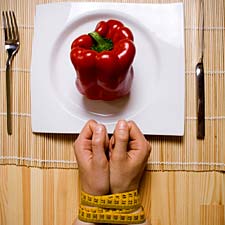Intermittent Fasting Can Make You Gain Weight, Says New Study
You have a special occasion coming up, so you decide to try one of the trendy new intermittent fasting approaches. Eat normally for five days, cut your calories to a mere 500 to 600 per day, and you'll lose weight, say advocates of this approach. But there's one problem,according to a new study reported on July 13: You might fit into those skinny jeans for the big occasion, but that diet plan can actually make you fatter when you abandon the diet.
The problem centers on the self-denial involved in these highly restricted diets. Dr. Eric Stice, who headed up the study at the Oregon Research Institute, examined why so many people gain weight after the diet ends. Dr. Stice pinpointed the restricted calorie diets as the culprit. "The story is a familiar one: most people are able to lose weight while dieting but once the diet is over, the weight comes back. Many of us can personally attest that caloric deprivation weight loss diets typically do not produce lasting weight loss."
Restricted Food Intake Equals Weight Gain in the Long-Run
When you restrict food so much, as typifies an intermittent fasting approach, it makes it more difficult to maintain your weight loss, says Dr. Stice. His research revealed "that restricting food intake increases the reward value of food, particularly high-calorie, appetizing food such as chocolate milkshakes and that the more successful people are at caloric-restriction dieting, the greater difficulty they will face in maintaining the restriction." In addition, when you fast for a full 24 hours or limit yourself to just 500 calories, you are increasing "the reward value of food, which may lead to poor food choices when the individual eventually does eat.”
The popular intermittent fasting diets generally allow you to eat what you want five days a week after drastically slashing your calories two days a week. Dr. Stice's research suggests that because you feel so deprived after those two restricted calorie days, you may actually eat so much that you negate the benefits of those two "fasting" days.
“Results imply that dieting characterized by meal skipping and fasting would be less successful than weight loss efforts characterized by intake of low energy, healthy foods,” he said.
What Works
To determine what is effective for weight loss, Dr. Stice compared how study participants reacted when shown photos of tasty foods, icky foods and glasses of water. He also measured their responses to eating and anticipation of eating fattening foods such as a chocolate milkshake versus calorie-free.
"These results are unique in that these data are the first to suggest that elective caloric restriction increases the degree to which brain regions, implicated in reward valuation and attention, are activated by exposure to palatable foods," said Dr. Stice. "The implications of this imaging study are crystal clear; if people want to lose excess weight, it would be more effective to consume healthy, low-fat/low-sugar foods during regular meals, rather than go for long periods of time without any caloric intake.”
His research revealed that those who ate more often every day were better able to control their food intake than those who denied themselves food for lengthy periods of time. For a healthier approach supported by Dr. Stice's research, consider the DASH diet, which stands for Dietary Approaches to Stop Hypertension. This food plan teaches you to eat healthy, low-fat, low sugar, low sodium foods at meals and at snacks, without deprivation. It is recommended by the government's National Institute of Health, which provides consumers with a detailed brochure on the plan.
-
4 Ways Intermittent Fasting Can Help You Burn Fat
-
Health Benefits – Ways of Target This particular Predicament
Attempting to keep fit is difficult given that you is possibly lured t
-
How To Raise Your Metabolism For Weight Loss
At the heart of all weight loss is the metabolism. The metabolism is t
-
Belly Fat-Ways Of Fast Fat Loss
Remember this fact: Belly fat is natural. Its main purpose is actually
-
Top 10 tips to Look Great at Christmas Parties whatever your Size
1. Fake it until you make it If your flesh is looking pale and pa
-
Healthy Snacks for Weight Loss
Often times, snacking can ruin a perfectly healthy diet. That is w
- DON'T MISS
- Eat Like a Greek God and Lose Weight
- Daily Guideline For Losing Weight
- Foods that Boost Your Metabolism
- Facts About Hoodia Cactus
- Can Being Overweight Be Inherited
- What are Benefits of Fish Oil in our Body?
- A 6-Minute High-Intensity Workout You Can Do Anywhere
- 5 Spice Salmon
- Successful Weight Loss With Hoodia Gordonii
- Why You Should Eat Your Fruits and Vegetables




